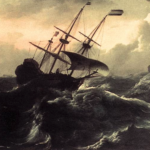As you’ve walked through life, you’ve doubtless noticed that there are many things that are good if you use them well and bad if you use them wrongly. Just because a thing can be used for harm doesn’t mean it’s a bad thing. Governments want to do away with cash, privacy, freedom, and many other inherently good things in the name of fighting crime or terrorism or whatever the latest war is declared to be.
A subset of these “good things that can be used badly” is “things that are inherently good but tend to seduce their possessors.” This includes things like intelligence, skill, beauty, money, power, humor, magnetic personality, and more. There is nothing wrong with any of them—indeed, they are extremely good. But those who have them in abundance very often are not.
It’s not the purpose of this blog post to explain this phenomenon, but perhaps the most seductive human trait is the desire to be accepted and included. This desire is another good thing. It is an important part of family, friends, church, community, and nation. But it also leads us into some of our worst errors and greatest dangers.
It can be a parent’s best friend or greatest enemy, depending on which crowd their child falls in with. It can propel us to greater thoughts and accomplishments than we ever dreamed, or enslave us in poverty of thought, heart, and situation—again, depending on the crowd we fall in with. (Though obviously there are other factors involved, and personal responsibility is paramount.)
“Peer pressure,” “groupthink,” “herd mentality,” and other expressions capture the downside of this need. And they are very much in operation now in America’s (and the world’s) investment markets. “The fear of missing out” is also an expression of this desire, though this fear is certainly fed by greed as well.
Most people will never control their desire for acceptance and inclusion. They will live with the herd and die with the herd. And the herd is heading into crocodile-infested waters in search of greener pastures. It’s not necessary for you to go with it.
The thought leaders whose work is summarized below expend a great deal of energy, effort, thought, and money to put together the publications they produce every week. Those publications are heavy on facts, reason, logic, and persuasion, winsomely presented. This is done to counterbalance the desire to follow the herd, which is basic and very, very strong. It can be overcome only by the reasoned thought of the individual, and such thought is invariably fed and strengthened by the thoughts of others who are not running with the herd.
As Charles Mackay tells us, ” Men…think in herds; it will be seen that they go mad in herds, while they only recover their senses slowly, and one by one.” So read the publications synopsized below, spend some time with them, feed your mind, develop good investing habits, and then take a better path than the herd does to those greener pastures.
Key Takeaways:
- Is this investing or gambling?
- The curse associated with not reading history
- Everybody agrees; how could we be wrong?
- The US budget is toast
The McAlvany Weekly Commentary: David and Kevin dig deep into market psychology this week, noting the complexities of greed and fear amid high interest rates, market-provided liquidity, and long-in-the-tooth bubble dynamics that continue to impress more as an opportunity than a risk. Confidence in the Fed’s ability to reconstitute and retain the good times has driven recent investing activity to an extreme, even as warning signs proliferate. In fact, investing in equities has become much more like gambling than prudent money management. The hosts contrast this manic purchasing of equities with manic purchasing of gold in China. Americans are buying Nvidia with a price-to-earnings (P/E) ratio of up to 97:1, while the Chinese are buying gold with premiums of up to $110/ounce. The difference in mentality and priority could hardly be greater. The hosts also discuss the US election and its worldwide impact, noting that, “There’s a growing danger that U.S. domestic election priorities completely shape international outcomes from Russia to the Middle East to China.”
Credit Bubble Bulletin: Doug begins his comments this week with his periphery and core analysis. China has reached another critical stage, while terminal phase excess rules in the US. He puts current market dynamics in historical context, comparing them with events in 2000 and 2008. As he does this, the scope of today’s market mania becomes clearer. It is astoundingly huge, so no wonder it carries so much with it when it gains speed. Loose market conditions apply throughout much of the world as well, and Doug describes the immensely disproportionate impact of the market leaders on the equities markets. He describes the many overheated markets today, recalls the Japanese meltdown of the 1980s-’90s, and concludes, ” I used to think we had learned important lessons. Major speculative asset Bubbles inflate during periods of low consumer price inflation. Protracted Bubbles leave a legacy of deep structural maladjustment. [They alter the physical, psychological, and operational landscape of a nation.] Chinese officials carefully studied the Japanese experience and then forgot everything. And I guess if the Federal Reserve can’t even recall lessons from the mortgage finance Bubble experience, we can’t expect much was gleaned from Japan’s eighties fiasco.” [Emphasis added.]
Hard Asset Insights: Setting up the blog entry above that introduces our publication synopses this week, Morgan notes that, “the consensus is all in. This week’s Investors Intelligence Advisors’ Survey shows that the committed bullish percentage has risen to a new rally extreme of 78%. By this measure, advisors are more bullish than at any time over the past two-and a-half years, which includes the highs in November 2021 and January 2022. At the same time, CNN’s Greed and Fear Index is at 78—the “extreme greed” quadrant of that indicator. In conjunction with these extremes, Market Vane’s Bullish Consensus is at 66, the highest reading since January 3, 2022 (67), when the S&P 500 made a closing high that preceded a 25% decline that stretched until October of 2022. Always remember, the history of markets is unambiguous when it comes to prices, sentiment, and narrative—they reverse at extremes. And we’re swiftly marching toward just those types of extremes on all three measures. Forewarned is forearmed.” Morgan’s analysis has for weeks detailed the extreme extent of the FOMO-fueled market mania, its flawed basis, and the indicators that what cannot continue will stop. Please note and heed his conclusion: forewarned is forearmed.
Golden Rule Radio: Tory begins the program this week emphasizing the importance for gold investors of asking the question: why am I buying gold? In answer, he suggests that the most important reason might be the US national debt. It is constantly being driven higher by government spending, and our debt-to-GDP is now 122%. Rob puts this in perspective by showing what the US’s budget would proportionally look like on a family scale. The family earns $65,100/year, has $114,600 in expenses, $49,385 in new debt on the credit card, and $428,000 in existing debt. Never fear, however, the family has just cut $115 from the budget. If you wonder how bad the mismanagement of the country’s finances has been, this should give you some idea—and also give you some idea why you might want to own an asset that is not dependent for its value on the full faith and credit of a government in the condition described immediately above. The hosts (also including Miles) look at other fundamentals as well before diving into the charts.















